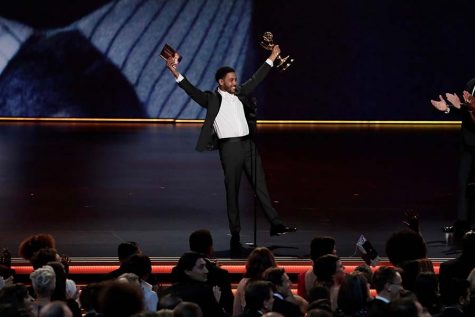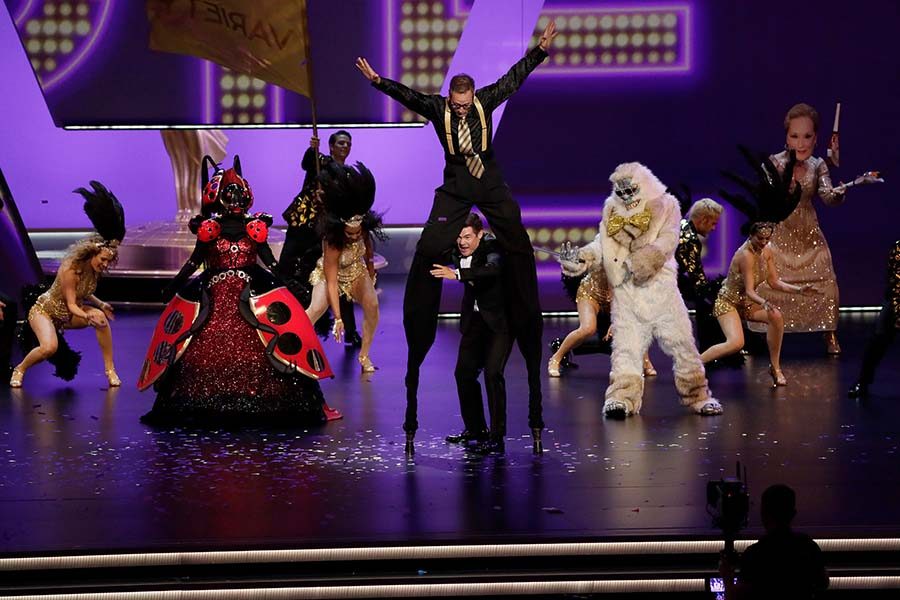The Emmys Entertain with No Entertainer
The 71st Primetime Emmy Awards struggled without a host, but was carried by plenty of smaller highlights worthy of their own accolades.
PHOTO | Photo courtesy of MCT Campus
Adam Devine and others make up for a lack of a host with impressive comedic (and in this case, theatrical) performances during the 71st Primetime Emmy Awards
With the decision to go without a host in order to pay homage to the historic television programs going off the air this year, according to FOX Entertainment CEO Charlie Colliers, many critics worried about the overall quality of the 71st Primetime Emmy Awards. And rightfully so. Held at the Microsoft Theatre in Los Angeles, California on Sunday, Sept. 22, the awards show got off to a shaky start: heavily relying on lazy jokes and cheap stunts to make up for the lack of a front runner.
But what the beginning of the show lacked in direction and show-stopping comedy, it made up for later in heart-wrenching speeches and clever award presenting. From musical numbers to marking milestones to empowering minority groups, the Emmy Awards had plenty of quality moments that saved the show.
Actress Alex Borstein took home the Emmy for Outstanding Supporting Actress in a Comedy Series for her performance as Susie Myerson in “The Marvelous Mrs. Maisel,” but her acceptance speech deserved an award as well. Borstein told the story of her grandmother, a Holocaust survivor.
“My grandmother turned toward a guard — she was in line to be shot into a pit — and said, ‘What happens if I step out of line?’ and he said, ‘I don’t have the heart to shoot you, but somebody will.’ And she stepped out of line,” Borstein said. “And for that, I am here. And for that, my children are here. So step out of line, ladies. Step out of line.”
Borstein’s rallying cry for women to “step out of line” received high praise from not only the audience, but also from notable figures such as actress Jamie Lee Curtis. “Our new motto,” Curtis said in a Tweet. “‘Step out of line ladies.’”
In a lighter moment, actor Ken Jeong made an attempt to connect to younger viewers through using the popular video-sharing app Tik Tok. Jeong used his time on stage with actor Nick Cannon presenting the award for Outstanding Writing in a Comedy Series by filming the audience screaming with the app. He then placed the clip in the middle of two videos showing his daughter opening and closing a door, making it seem as if she had opened a door only to face a rowdy audience. Although slightly awkward, the moment was a much needed comedic break for audience members and viewers alike.
Actor Adam DeVine shocked the audience with a Tony Award-worthy musical performance about the “Variety” category of television. Backed by a bizarre ensemble featuring a juggler wearing a mask with the likeness of actress Meryl Streep, a yeti with confetti and a stilt walker impersonating television host Larry King, DeVine serenaded the audience with a jazzy song listing all the concepts that could fall under the “Variety” category. With such high theatrics for a television award show, DeVine arguably had one of the most memorable performances of the night.
One of the more touching moments during the show came when actor Jharrel Jerome received the Emmy for Outstanding Lead Actor in a Limited Series or Movie for his portrayal of Korey Wise in the series “When They See Us,” which recounted the true story of the five black teenagers wrongly convicted of rape in 1989 known as the “Central Park Five.” In his speech, Jerome dedicated the award to the men the series is focused around, referring to them as the “Exonerated Five.”
“This is for Raymond, Yusef, Antron, Kevin and King Korey Wise. Thank you so much.” Jerome said. “It’s an honor. It’s a blessing.”

Actor Jharell Jerome accepts his Emmy Award for Outstanding Lead Actor in a Limited Series during the 71st Primetime Emmy Awards on Sept. 22.
In perhaps the award show’s most celebrated outcomes, actor Billy Porter became the first openly gay man to win Best Actor in a Drama. Porter won for his performance as Pray Tell in the show “Pose,” which explores the LGBTQ+ presence in the New York ballroom scene in the late 1980s and early 1990s. He ended his acceptance speech with a call to action.
“We are the people,” Porter said. “We as artists are the people that get to change the molecular structure of the hearts and minds of the people who live on this planet. Please don’t ever stop doing that. Please don’t ever stop telling the truth.”
The decision to go without a host was risky and didn’t fully prove itself to be worth it in this case in terms of comedic value. But it is undeniable that the show was carried by not only the hilarious (albeit ridiculous at times) performances by presenters, but also by the powerful calls to action and the heartfelt emotion displayed by the winners in their acceptance speeches. This year’s Primetime Emmy Awards showed audiences that award shows just might not need to rely on a hilarious host anymore to be entertaining.



